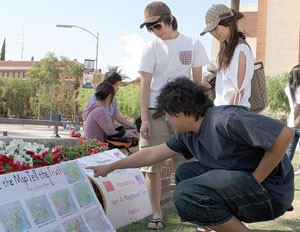If you visited the UA Mall yesterday afternoon, you might have come across Suki Jiao, a student from Quingdao, China, who will be attending the UA in August.
If so, she tried – with a quick smile and quicker shift of the arm – to hand you a promotional packet on Beijing, the site of this year’s Summer Olympic Games: “”Take this. Please.””
“”There’s a lot of negative information on Web sites about the Olympic Games,”” she said. “”We just want to prove that it’s not so clear and let everyone know more information.””
About 20 students and Chinese residents of Tucson demonstrated near the Mall stage to create an impression of their home country that contrasted with recent media reports of violence and widespread protest.
They erected two Chinese flags at corners of the stage and, behind them, weighed down with rocks, a large white banner displaying this year’s Olympic symbol and the words “”Beijing 2008″” above the Olympic rings.
Signatures of about 300 people swarmed the banner. Written in Chinese, they came from a group, including most of the crowd on campus yesterday, that tried in vain to get its pro-China perspectives heard at a Human Rights Torch Relay protest April 12 at Reid Park.
The organizers of the demonstration devised the UA event in the weeks that followed, said Kim Sayers, an accounting senior.
“”We didn’t want to be rude (at Reid Park),”” she said. “”We know this is a free country, where you can speak up when you want.””
A main message of the demonstration was that “”the Olympic Games are free from politics,”” said Terry Su, a finance graduate student.
Recent events worldwide – including deadly riots in Tibet last month and uprisings of rancor at many stops in the international Olympic torch relay – have imbued Beijing with an ominous connotation, organizers said.
To counter that perception, they arranged posters that contrasted violent black-and-white images of life in Tibet before 1951, when the Central Asian region reintegrated with Beijing after nearly 40 years of subordination, with more serene, colorful scenes from in recent years.
“”China is really not a dangerous place like people think,”” Sayers said, adding that students should “”get to know the real China”” by visiting.
Will Driscoll, a second-year evolutionary biology graduate student, stopped by in light of his stays in Xingjiang, north of Tibet, in 2006 and 2007.
He said he had been aware of the political tumult in Tibet and wanted to gauge organizers’ opinions on Xingjiang, where he taught English and attended summer school.
“”The culture, with all the folk dancing and the costumes, it’s really an amazing spot,”” he said. “”You never hear about it out here.””









